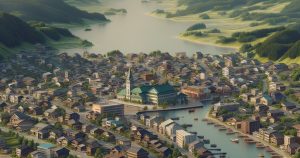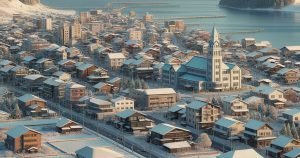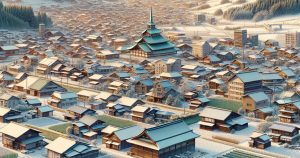Bibai City once flourished as an important base during the pioneer era and contributed to the development of Hokkaido as a center of the coal industry. From this historical background, the history of coal mining still lives on alongside agriculture. Fresh local ingredients nurtured in a rich natural environment further enrich the life in Bibai. Additionally, the unique dialect “Bibai-ben” and the locally loved Bibai-yaki showcase the region’s unique charm woven from its climate and culture. Various festivals held throughout the year, such as the Bibai Coal Mine Festival and the Bibai Music Festival, deepen the bonds among citizens and convey the allure of Bibai to visitors. This article will thoroughly introduce the attractions of Bibai City. The region’s abundant nature not only produces agricultural products but also generates rich water sources, with fish raised in clear streams becoming another specialty of Bibai. Furthermore, Bibai City is a tourist destination with beautiful scenery throughout the four seasons, inspiring travelers from various places. In particular, the winter snow scenery and the winter festivals that adorn it are a sight to behold.
Culture and Customs
Hokkaido’s Bibai City has been an important base since the pioneer era, especially flourishing as a center of the coal industry. Therefore, even today, one of the industries in Bibai City is agriculture, while another traces the history of coal mining. Life in Bibai City is blessed with a rich natural environment, allowing residents to enjoy fresh local ingredients. In particular, Bibai-yaki is a local specialty dish with a taste that is unforgettable once tried. Additionally, Bibai City is a region with a unique dialect, Bibai-ben. This dialect is used mainly by some elderly residents, but its distinctive sound colors the lives of local people. In festivals, Bibai City takes pride in its history. The Bibai Coal Mine Festival, in particular, is a symbol of this pride, celebrated grandly by the citizens while honoring the history of the coal industry. The Bibai Music Festival enhances the local music culture and provides citizens with a time of relaxation. The culture and customs of Bibai City, as described above, reflect the richness of the region’s history and natural environment, leaving a deep impression on visitors. Furthermore, traditional crafts passed down through generations are also alive in the lives of the citizens. One of these is Bibai sashiko, a technique that creates patterns with colorful threads, captivating the hearts of those who visit. Additionally, the charm of Bibai City is also reflected in its seasonal landscapes, with the winter snow scenery being particularly renowned for its beauty.
Local Specialties
- Bibai Charcoal: Bibai City once thrived as a coal mining town, and its high-quality “Bibai Charcoal” is known nationwide.
- Bibai Yakisoba: The “Bibai Yakisoba,” characterized by its black noodles, is a local gourmet dish born as part of town revitalization efforts.
- San-shoku Dango: The local sweet “San-shoku Dango” from Bibai City is a popular wagashi known for its cute appearance and gentle flavor.
- Bibai Melon: The “Bibai Melon,” a summer specialty, is unforgettable for its sweetness and juiciness.
- Bibai Ekiben: The “Bibai Ekiben,” sold at the train station, is attractive for its luxurious contents made with local ingredients.
Annual Events
- Bibai City Snow Lantern Festival: A winter tradition held in February, where snow sculptures and snow lanterns decorate the city, creating a magical atmosphere.
- Bibai Mine Summer Festival: Held in late July, this festival features a float parade and dance performances, providing summer enjoyment for citizens.
- Bibai Pottery Market: An event where potters of Bibai-yaki gather to display and sell their works, held in late September.
- Bibai Gourmet Festival: A festival where visitors can enjoy delicious local cuisine, held in early November, allowing an experience of Bibai City’s food culture.
- Bibai Citizen Marathon: An event aimed at promoting health and citizen interaction, held in October, where participants can enjoy the rich nature of Bibai City.
Access Methods
- By Air: It takes about 1 hour from Chitose Airport to Bibai City. You can use a taxi or rental car for transportation from the airport.
- By Train: From New Chitose Airport Station, take the Rapid Airport to Sapporo Station, then transfer to the Limited Express Super Ohotsuku to Shin-Yubari Station. The journey takes about 2.5 hours.
- By Bus: You can take the Do-O Bus “to Bibai” from Sapporo Station, which goes directly to Bibai City. The travel time is about 2 hours.
- By Car: If driving from Sapporo, the common route is to use the Do-O Expressway and exit at Bibai IC. It takes about 1.5 hours to drive.
- By Bicycle: A bicycle trip from Sapporo is also possible. It takes about 6 hours, but you can enjoy the nature of Hokkaido.
Tourist Attractions
- Bibai Coal Miners’ Song Museum – A museum where you can learn about the history of the coal miners’ songs of Bibai.
- Bibai City Coal Museum – A museum that introduces the history of the coal industry in Bibai City.
- Bibai City Art Museum – An art museum that exhibits works by local artists.
- Bibai City Local History Museum – A museum that introduces the history and culture of Bibai City.
- Bibai City Coal Memorial Park – A park commemorating the coal industry of Bibai City.








